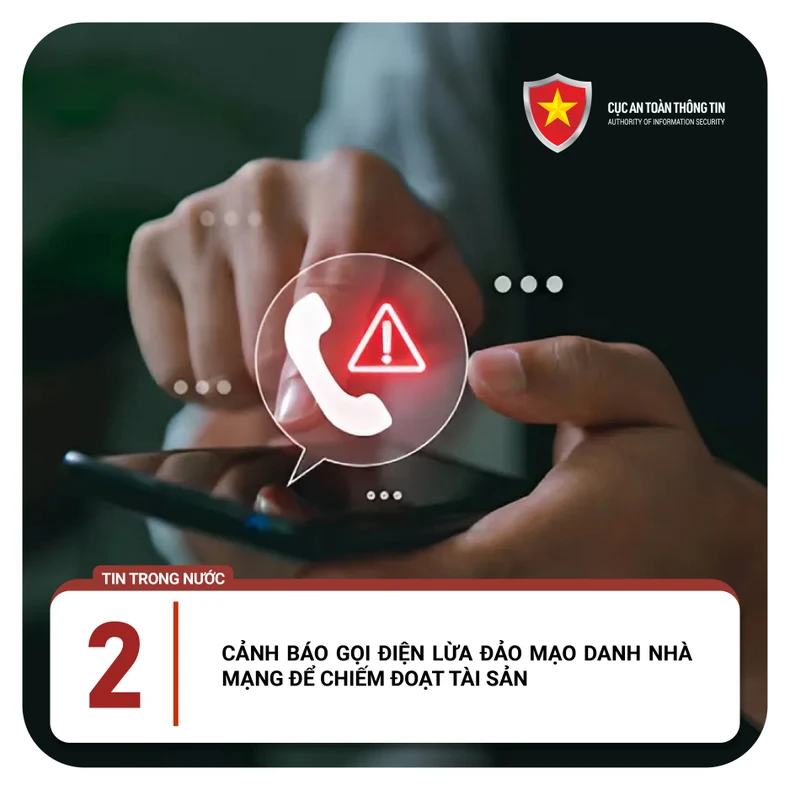NDO - At the beginning of the new year, many people, with the desire to know in advance about disasters to prevent them, or are curious about the future in the coming year, have the habit of going to fortune-tellers, but many cases fall into the situation of "losing money and getting sick". The Department of Information Security (Ministry of Information and Communications) recommends that people need to be more vigilant and careful not to blindly believe in forms related to spirituality on social networks.
 |
At the beginning of the new year, many people, with the desire to know in advance about disasters to prevent them, or are curious about the future in the coming year, have the habit of going to fortune tellers, but many cases fall into the situation of "losing both money and health".
According to recorded information, on the occasion of the recent Tet 2025, taking advantage of the spiritual factor at the beginning of the year, many people went to pray with the wish for a peaceful and prosperous new year, the situation of online fortune telling (on social networks) continuously flourished, these groups had hundreds of thousands of members participating.
Superstition is understood as people having strong beliefs in frivolous, vague things such as fortune telling, spells, and divination, etc. to make listeners believe in supernatural and mysterious phenomena.
Therefore, victims of these tricks are often at a dead end, losing faith in real life, leading to blind belief in spiritual factors. Meanwhile, taking advantage of that psychology, the subjects will "add water to the rain", using threatening words to make the victims afraid and want to be cured.
Many people have to spend large sums of money to get rid of bad luck or pray for material things. There are even cases where people use charms and spells to harm others.
To avoid the above sophisticated scams, the Department of Information Security (Ministry of Information and Communications) recommends that people need to be vigilant and careful not to blindly believe in spiritual forms on social networks.
You should only choose and go to reputable addresses, do not trust too much in the disguised forms of spiritual reading on the internet. Users need to carefully research and verify the identity of the subject before making any transaction on social networks.
Be vigilant and do not send donations to accounts of unknown origin. If you become a victim of a scam, report it immediately to the police for timely support and resolution.
 |
Taking advantage of the ignorance of older people who have little knowledge about social networks and technology, scammers will call to threaten lawsuits, causing many people to lose tens to hundreds of millions of dong.
Specifically, recently, Mr. LV.M (residing in Hanoi) received a strange phone call claiming to be an employee of Viettel network, informing Mr. M about his telecommunications debt and asking him to pay more than 10 million VND to end the debt.
When Mr. M questioned the large amount of money, the subject gave a series of reasons such as calling abroad... The subject even threatened that if he did not pay the full amount within 24 hours, he would disconnect his subscription and file a lawsuit, and the police would call to verify. However, because he was warned in time, Mr. M did not fall into the subject's trap and reported the incident to the police.
It can be seen that the common trick of the above scammers is to impersonate employees of major network operators and call to inform the victim that they owe a large amount of money in telecommunications fees.
Here, the subject requires the victim to pay immediately or the subscriber number will be blocked, communication will be suspended and a lawsuit will be filed. If the customer objects, the subject will ask for the address and personal account with the reason of checking again to collect the customer's personal information (name, age, address, ID number, household registration, bank account, OTP code...) to defraud and appropriate property.
After a few days, the subjects will call back and inform that the personal account of the phone subscriber is being used for illegal activities and request to transfer all the money in the account for investigation or they will call to threaten and extort money from the subscriber.
Faced with the above situation, the Department of Information Security (Ministry of Information and Communications) recommends that people need to be highly vigilant and spread the word to relatives and friends about the above scams.
For problems arising during the use of network services, people need to contact the network hotline or go to transaction offices for timely advice and resolution.
Note, absolutely do not transfer money or provide personal information to strangers over the phone, avoid falling into the trap of fraudsters. When detecting cases with signs of fraud, immediately report to the nearest police station for timely support and resolution.
 |
Recently, warnings about the method of controlling phone numbers from bank account numbers have been widely circulated on social networks. This new trick is considered very dangerous.
Accordingly, by trying to log in on the bank's website and entering the wrong information many times, the subjects will cause the victim's account to be locked. At that time, they will pretend to be a bank representative and call, luring users to the link to download the fake application.
When their accounts are locked out, less experienced users can easily panic and believe the scammers. They may provide the scammers with some personal information, login information, or be tricked into installing malware.
These malwares, after penetrating the device, can request deep access to the device, from which the attacker can take control of the device and perform many actions, such as stealing data, remotely monitoring the device and user, capturing sensitive information such as passwords, OTP codes, and even transferring money using biometric facial features on the victim's phone.
It can be seen that this is a very sophisticated and professional trick, the account number and phone number are often made public by many people, and two numbers or emails can be used to log in. In addition, this information is also sold on the black market for data and there are many ways to collect it.
Regarding the above information, the Department of Information Security (Ministry of Information and Communications) recommends that users should note that when encountering problems with their bank accounts, they should go to the counter to do it directly or proactively contact the bank's official customer care channel.
Absolutely do not access strange links or download applications of unknown origin. Do not provide personal information, bank account information, OTP code in any form. In case of suspicion of being scammed, people need to immediately report to the bank or authorities for timely support, resolution and prevention.
 |
Recently, the Singapore Customs Department has issued a warning about fake scams, approaching people through email messages with false content to steal personal information and assets.
The bad guys created fake email messages, using the logo of Singapore Customs. The message content included the subject: “Tax refund notice” and informed that the people’s tax refund request had been approved and processed, asking people to access the attached link to verify the information and make a money transfer transaction.
To increase credibility, the email message includes full information such as the amount of money that people will receive, time, transaction method, tax code and promises that people will receive the money after 5 to 10 days.
After accessing the link, people will be asked to provide personal and banking information to proceed with tax refund procedures. At this time, the subjects will have the victim's information, using it to carry out many other fraudulent tricks.
In the face of ongoing scams, the Information Security Department (Ministry of Information and Communications) recommends that people be vigilant when receiving messages with similar content as above. Be careful to verify information through reputable news sites or official information portals.
Absolutely do not follow instructions, do not access strange links, do not provide personal information when not sure that the website you are accessing is genuine. When detecting suspicious signs, people need to quickly report to the authorities to promptly investigate and prevent fraudulent behavior.
 |
Recently, WRAL television station (North Carolina, USA) issued a warning about a scam through text messages, impersonating the Internal Revenue Service (IRS) to inform people that they will receive a large sum of money, with the purpose of stealing people's sensitive information and data.
Recently, the Australian Cyber Security Center (ACSC) has warned about fake scams, approaching victims via email to entice people to provide personal and banking information or download malicious applications and software.
The scammers create fake messages and proactively send them to the victims. The content of the message states that one of the online accounts owned by the victim has had suspicious activities related to fraud. If the victim does not respond promptly, they will be at risk of facing fraud charges according to the law.
The victim will then be asked to access a link attached to the message to verify the information. After clicking on the link, the victim will be redirected to a fake ACSC website, which has the same logo and interface as the legitimate website.
Here, the victim will be asked to provide personal information such as phone number, home address, ID number,... and bank information to prove that their account has no fraudulent activities.
In some cases, bad actors also ask to download fake software with the purpose of checking the victim's device, the purpose is to steal sensitive data and information that the victim owns on the device.
In response to the development of fraud, the Department of Information Security (Ministry of Information and Communications) recommends that people be vigilant when receiving messages notifying them of unusual amounts of money. Carefully verify the content of the message through reputable news sites or official information portals.
Never access strange links or download strange applications, provide personal information, bank information or transfer money without verifying the legitimacy of the website or the identity of the sender.
When encountering suspicious signs, people need to quickly report to the authorities to promptly investigate and prevent fraudulent behavior.
 |
A Singaporean woman recently reported to the police a scam involving impersonating a Shopee employee and demanding payment for insurance premiums to appropriate property. The victim reportedly transferred S$100,000 (over VND1.8 billion) to the scammers.
Initially, the subject proactively called the victim, claiming to be a Shopee customer service employee, informing him that the victim had not paid the insurance fee for the goods. For further information, the subject forwarded the victim's call to a person claiming to be a bank employee.
During the conversation, the person said that the victim was suspected of being involved in a money laundering case, and asked the victim to transfer money to the Monetary Authority of Singapore (MAS) to verify the matter.
After making the accusation, the call continued to redirect the victim to a subject claiming to be an officer of MAS, instructing the victim to make a money transfer to serve the investigation process and verify the accusations that the bad subjects made to the victim. After only a few hours, the victim transferred $100,000 to the scammers.
In light of the developments of the incident, the Department of Information Security (Ministry of Information and Communications) recommends that people be vigilant when receiving strange calls. Carefully verify the identity of the caller through a phone number or a reputable and official information portal.
Never follow the instructions of strangers, do not provide personal information or transfer money without verifying the information and identity of the subject.
When detecting signs of fraud, people need to quickly report the caller's phone number to the authorities to promptly investigate and prevent fraud.
Source: https://nhandan.vn/canh-giac-voi-chieu-tro-lua-dao-xem-boi-giai-han-online-dau-nam-moi-post858626.html


















































Comment (0)